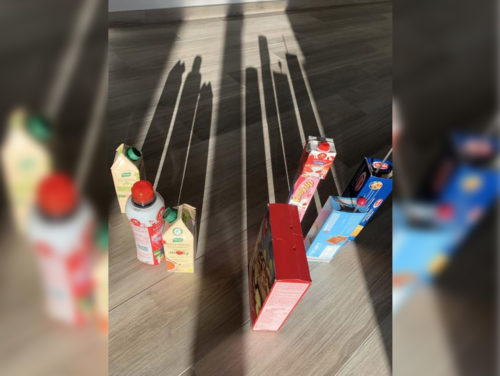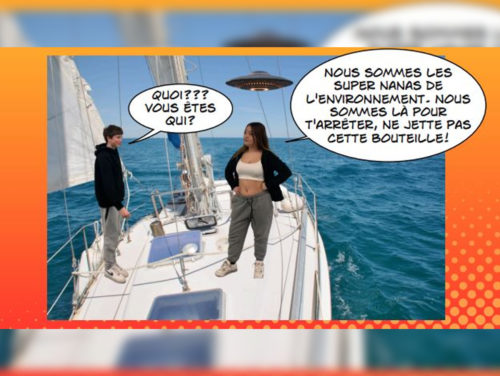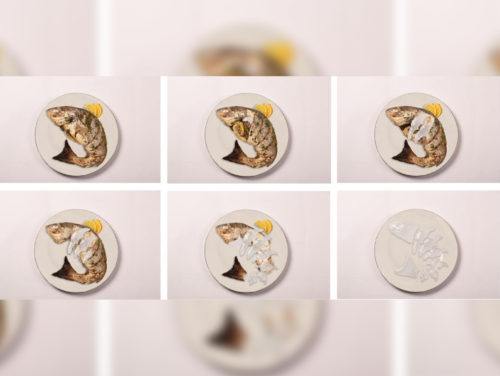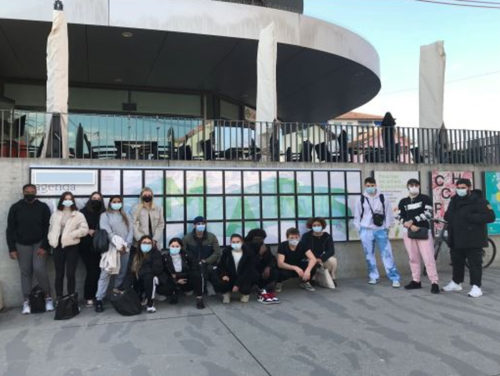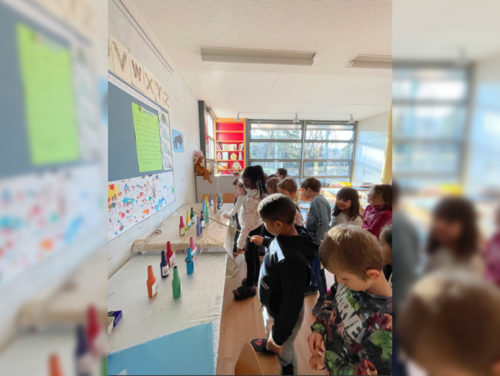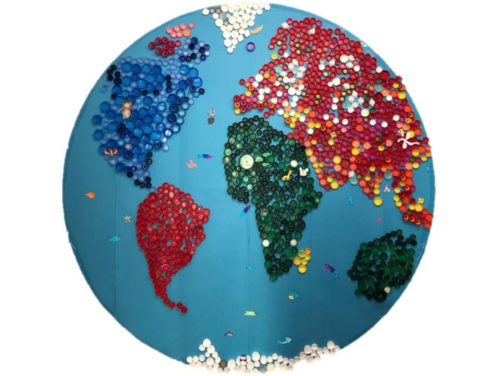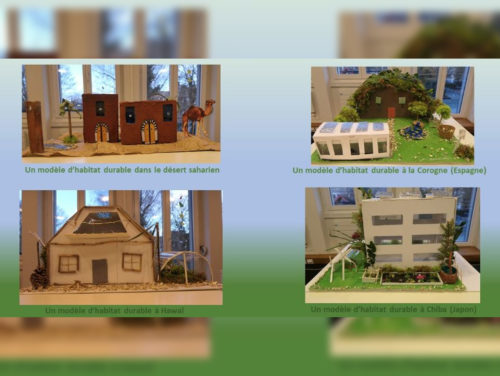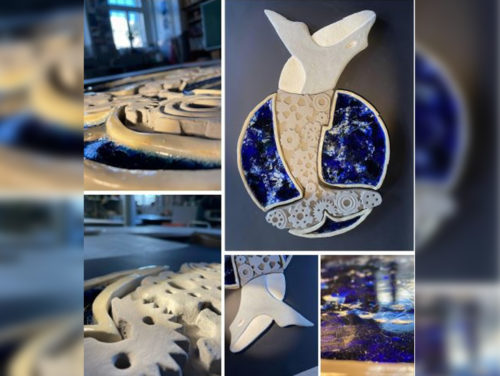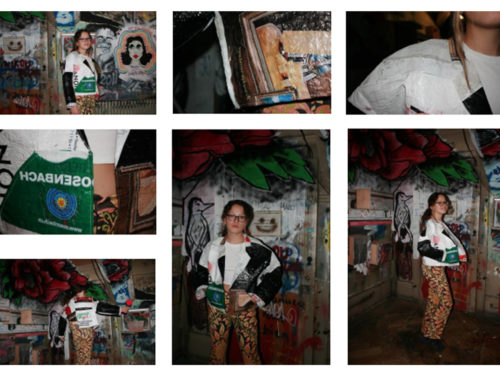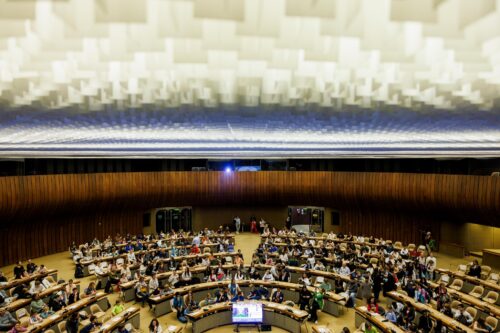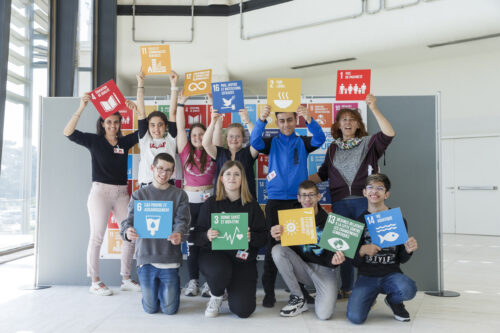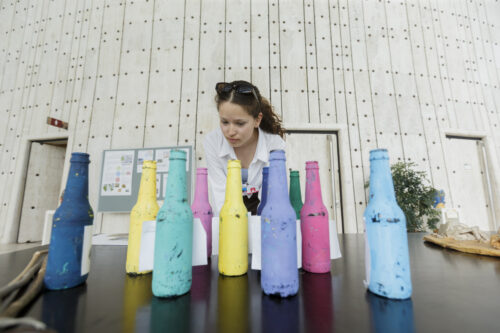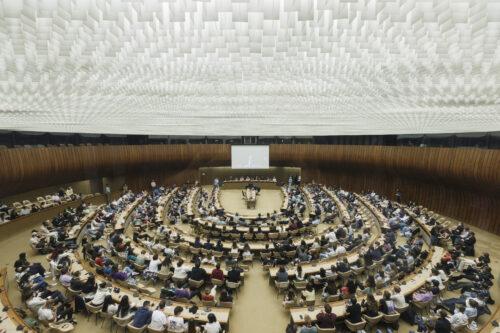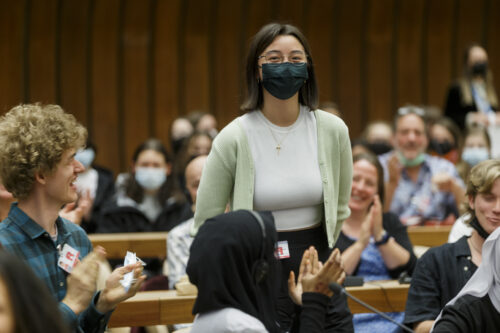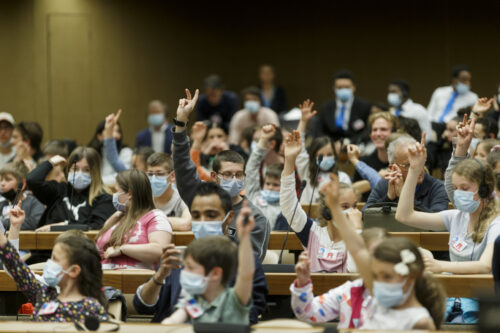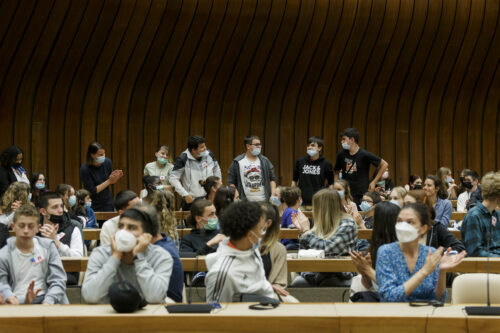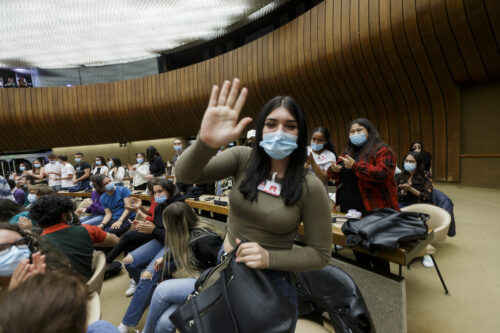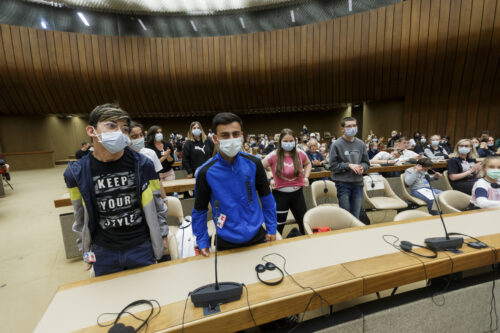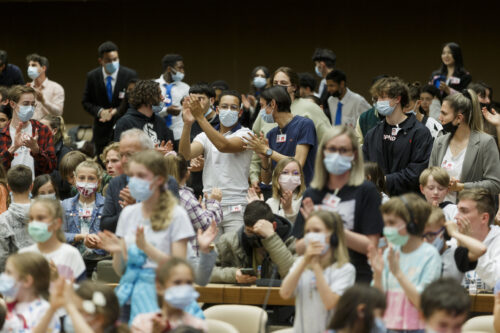Let’s go sustainable! Think global and act local
Competition 2021/2022
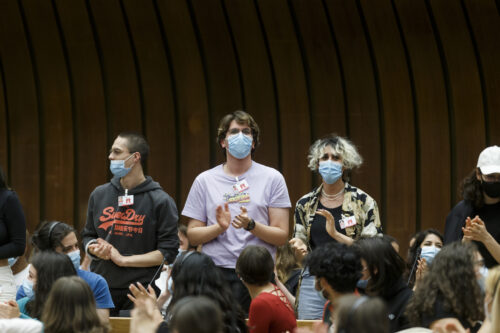
A look back at this year’s edition
After two years of living with the pandemic, the national school competition on the Sustainable Development Goals offered students from all over Switzerland the opportunity to reflect and work together for a more sustainable future. The awards ceremony held May 4, 2022 at the Palais des Nations (UN office in Geneva), was an opportunity to meet and celebrate the work accomplished. The juries designated the winners of the competition and the projects chosen for the Françoise Demole Award. The list of laureates can be found below, and all the competition projects are available in the “resources” pages. Eduki congratulates all the participants for the quality of their work and their commitment.
Watch the video
Making-of competition video, produced by Espace entreprise apprentices
Awarded Projects
22 projects, divided into categories (artistic, media, and concrete action), were awarded by the jury members, out of 126 submitted entries. The 1st and 2nd prizes for each school level (primary, secondary I & II) in each category, as well as any special mentions, were awarded.
Le guide du citoyen responsable des Ponts-de-Martel
École des Ponts-de-Martel, cercle scolaire de la Chaux-de-Fonds, NE
As part of the 2021/2022 Eduki national competition entitled “Let’s go sustainable! Think global and act local”, on Sustainable Development Goals 11, 12 and 13, the students came up with the following project: “We started with the subject of environmental protection, whether it be waste recycling, limiting pollution and ecological behavior. Even if the subject is known by the students, we realized that it is a sometimes daunting, even depressing theme. During the class council, we judged that this subject was part of the theme and covered several SDGs, but especially SDG 12, the most accessible to students of this age. However, for students aged 6-7, they themselves said that it is difficult to understand. We therefore discussed making the understanding of sustainable consumption and production accessible, and in a fun way! So we set out to create a work, then of a game to understand this topic, using recyclable materials. However, we ruled out food conservation and waste, because the subject was complex for the students, and it was difficult to generate ideas.”
L’avenir dans nos mains
Groupes HPI / écoles de Villars-Vert et Avry, FR
As part of the national Eduki Competition 2021/2022 entitled “Let’s go sustainable! Think global and act local”, focusing on Sustainable Development Goals 11, 12, and 13, primary school learners from the HPI group imagined the following project: “We designed a collaborative board game aimed at encouraging discussion and reflection around the theme of ecology. We created a prototype game board and question cards. Our goal is to continue developing our ideas and rethink our creation to make it more practical, more dynamic, and more relevant.”
Un pour tous, tous pour la planète !
École française internationale de Berne, BE
As part of the national Eduki Competition 2021/2022 entitled “Let’s go sustainable! Think global and act local”, focusing on Sustainable Development Goals 11, 12, and 13, the learners imagined the following project: “This project aims to place learners at the heart of the process for long-term sustainable development as part of the move to our school’s new premises. They completely changed the lighting in the classrooms to save energy.”
Le RE-cycle d’orientation
C.O. des Voirets, GE
As part of the national Eduki Competition 2021/2022 entitled “Let’s go sustainable! Think global and act local”, focusing on Sustainable Development Goals 11, 12, and 13, the learners imagined the following project: “This artwork was created with SDG 13 on climate action in mind. The whale represents nature, especially in our oceans. Its tail is covered in gears, symbolising pollution. However, it is leaping out of the sea, showing us that there is still hope if we choose to act now.”
Des villes plus durables en Suisse et dans le monde. Aménagements urbains pour la population de Chavannes-près-Renens.
Gymnase de Renens, VD
As part of the national Eduki Competition 2021/2022 entitled “Let’s go sustainable! Think global and act local”, focusing on Sustainable Development Goals 11, 12, and 13, the learners imagined the following project: “For these seven projects, the learners collaborated with urban planners from the municipality of Chavannes-près-Renens to improve the well-being of the community. They analysed the existing infrastructures to propose personal projects that make these urban spaces more sustainable.”
Umweltwoche (Semaine de l’environnement)
Gymnasium Bäumlihof, BS
As part of the national Eduki Competition 2021/2022 entitled “Let’s go sustainable! Think global and act local”, focusing on Sustainable Development Goals 11, 12, and 13, the learners imagined the following project: “This project aims to raise awareness and encourage learners and educators to reflect more deeply on the theme of environmental protection and to present strategies for engagement in this field. The goal is to show them the possibilities available to them. We want to stimulate debate among learners and carry out various projects in areas such as consumption and mobility.”
De l’objet au déchet. Fables contemporaines pour une transition écologique sereine.
Cycle de Drize, GE
As part of the 2021/2022 Eduki national competition entitled “I’M GOING SUSTAINABLE! Think global and act local”, on Sustainable Development Goals 11, 12 and 13, the students came up with the following project: “Using the COmic Life 3 software, students in groups of 3-4 must tell a story related to the SDGs in the form of a photo-novel/comic book. The goal is to captivate the reader by formulating a scenario, staging a story, all in an aesthetically pleasing way. For example, this will involve comparing different behaviors in relation to waste. Where do the aluminum cans we consume come from and where do they end up? Farting? etc. In the form of an investigation, by using humor and curiosity through the boxes, we hope to convince readers to adopt the best actions for the environment! Apart from waste, another interesting avenue would be to compare various ecological habitats: house, building, ecological cooperative,… Always with the same format: a comic strip where students can take pictures of themselves and thus become actors in their fiction or by using fictional or real characters found on the internet.”
Serves up!
Ecole Internationale de Genève / Campus des Nations, GE
As part of the 2021/2022 Eduki national competition entitled “I’M GOING SUSTAINABLE! Think global and act local,” on Sustainable Development Goals 11, 12, and 13, the students came up with the following project: “The aim of my project is to serve as a powerful reminder that overconsumption of plastic is still as serious as ever, so much so that it has progressed to the point of harming marine life. I created a series of photos showing the gradual decline of fish as a result of plastic consumption. There is an aerial shot of a gourmet fish, and with each bite, the image slowly reveals a plastic mold of the same fish. This suggests how polluted the ocean is.”
Mutations urbaines liées à la crise sanitaire. Approche géographique et artistique.
Gymnase de Renens, VD
As part of the 2021/2022 Eduki national competition entitled “I’M GOING SUSTAINABLE! Think global and act local”, on Sustainable Development Goals 11, 12 and 13, the students came up with the following project: “As part of geography lessons, two classes had the opportunity to discover a book entitled [outside] which was produced by two French-speaking Swiss, William Gammuto (photographer) and Thierry Raboud (writer). This book allows them to observe some sudden urban transformations caused by the pandemic in March 2020, as well as to feel several emotions linked to these changes. Accustomed to using more scientific methods during geography lessons to understand the world around them, the students were able to experiment with this approach which brings science and art into dialogue by observing more specifically the changes in their municipality (local) and in other countries (global) in March 2021. The result of this work is the publication of a brochure where the students’ poetic texts and photographs are highlighted. An exhibition of all the students’ personal productions is planned for March 2022, if the health situation allows it.”
La pêche aux bons gestes
École De Budé-Genêts-Crêts, GE
As part of the 2021/2022 Eduki national competition entitled “Let’s go sustainable! Think global and act local”, on Sustainable Development Goals 11, 12 and 13, the students came up with the following project: “We started with the subject of environmental protection, whether it be waste recycling, limiting pollution and ecological behavior. Even if the subject is known by the students, we realized that it is a sometimes daunting, even depressing theme. During the class council, we judged that this subject was part of the theme and covered several SDGs, but especially SDG 12, the most accessible to students of this age. However, for students aged 6-7, they themselves said that it is difficult to understand. We therefore discussed making the understanding of sustainable consumption and production accessible, and in a fun way! So we set out to create a work, then of a game to understand this topic, using recyclable materials. However, we ruled out food conservation and waste, because the subject was complex for the students, and it was difficult to generate ideas.”
Terre Happy
École Primaire Moser, GE
As part of the 2021/2022 Eduki national competition entitled “Let’s go sustainable! Think global and act local”, on Sustainable Development Goals 11, 12 and 13, the students came up with the following project: “Happy Earth Project” Sustainability is the theme of the year for our primary school. For several days, the students collected plastic bottle caps to complete the artwork located at the entrance to the building. For this back-to-school activity, in a creative and collaborative approach, the students commit to giving a second life to used objects by transforming them into something new. They thus experiment with the concept of upcycling. Learning while having fun and having fun while learning: this is how the students become aware that upcycling allows us to use less resources and avoid the additional creation of raw materials. The theme of sustainability in our school has also been reflected in several other actions, such as the decoration of our Christmas tree, again thanks to the upcycling concept: used coffee capsules, old newspapers or used cups.”
Renaturer l’habitat et protéger la biodiversité
École française internationale de Berne, BE
As part of the 2021/2022 Eduki national competition entitled “Let’s go sustainable! Think global and act local”, on Sustainable Development Goals 11, 12 and 13, the students came up with the following project: “As part of the Eduki competition, the students chose to focus on housing, an important issue of sustainable development, which they address in several school subjects. Modern housing is not very sustainable in terms of energy and sensitive to climate constraints. The pressure on space and the natural environment threatens biodiversity. How can we use elements of nature and scientific knowledge to make housing sustainable and protect biodiversity? Final production: Collaborative models of renatured habitats adapted to geographical and climatic constraints. The students decided to work on different regions in order to diversify the project and show the need to adapt solutions to the geographical and climatic context. The students are made aware of the sustainability of housing today and in the future. They reflect on a problem current and to valid long-term solutions.”
Mechanical Whale
École Internationale – La Châtaigneraie, VD
As part of the 2021/2022 Eduki national competition entitled “Let’s go sustainable! Think global and act local” on Sustainable Development Goals 11, 12, and 13, the students came up with the following project: “This piece was created with SDG 13 on climate action in mind. The whale represents nature, especially in our ocean. Its tail is covered in cogs, which illustrate pollution. However, it jumps out of the sea, showing us that there is still hope if we choose to act now.”
The shadow of our wastes
École Internationale de Genève (Campus des Nations), GE
As part of the 2021/2022 Eduki national competition entitled “Let’s go sustainable! Think global and act local”, on Sustainable Development Goals 11, 12 and 13, the students came up with the following project: “My project aims to draw attention to food waste, which is a major global problem, and how it can lead to an increase in greenhouse gas emissions, which is one of the causes of climate change. The idea came from seeing how much food waste we were producing, even as a relatively small family of four, and I also saw all the food packaging we were bringing to the recycling center every week.”
L’écoveste
Lycée Jean Piaget, NE
As part of the 2021/2022 Eduki national competition entitled “Let’s go sustainable! Think global and act local”, on Sustainable Development Goals 11, 12 and 13, the students came up with the following project: “The aim was to create a mid-season jacket using plastic bags in order to reuse materials without consuming too much electricity. The eco-jacket is therefore made up of several patterns that make it unique.”
Voyons les personnes avant leurs handicaps
École primaire de Pinchat, GE
As part of the national Eduki Competition 2021/2022 entitled “Let’s go sustainable! Think global and act local”, focusing on Sustainable Development Goals 11, 12, and 13, the learners imagined the following project: “The children’s initial idea was to work on the inclusion of diverse people within a neighbourhood. One learner in the group had recently moved, which inspired them. The goal of the project is to raise awareness about the inclusion of people with disabilities or those who are different.”
Changer le monde de manière créative (Kreativ die Welt verändern)
Primarschule Embrach, ZH
As part of the national Eduki Competition 2021/2022 entitled “Let’s go sustainable! Think global and act local”, focusing on Sustainable Development Goals 11, 12, and 13, the learners imagined the following project: “Our goal is to encourage people to protect the environment through our website. Initially, we wanted to upload an environmental game and written instructions for a compact herb garden. Over time, other ideas were added. Some had to be removed due to technical and financial reasons (e.g., building a virtual city), but others were put into practice. That’s how sustainability labels, Madame Frigo, video instructions for the herb garden, mask recycling, and our contribution to environmental protection with mysimpleshow found their place on the site. This expansion of our website came as we continued reflecting on the SDG themes. We aimed to create as comprehensive a website as possible. Some ideas also came to us during our free time, like recycling mask straps, because we use so many masks. The idea of sustainability labels came from reading a book. This is a mixed-age group project: three learners are 9 years old, two are 10, and two are 12.”
Fast Fashion
Kantonsschule Alpenquai Luzern, LU
As part of the national Eduki Competition 2021/2022 entitled “Let’s go sustainable! Think global and act local”, focusing on Sustainable Development Goals 11, 12, and 13, the learners imagined the following project: “An animated film about the definition and concrete issues of ‘Fast Fashion,’ a widespread practice that involves consuming and using disposable, low-quality clothing. The film illustrates a concrete example of a person who follows this practice.”
Klimaschutz (Protection du climat)
Kantonsschule Alpenquai Luzern, LU
As part of the national Eduki Competition 2021/2022 entitled “Let’s go sustainable! Think global and act local”, focusing on Sustainable Development Goals 11, 12, and 13, the learners imagined the following project: “An animated film about the history and growing awareness of rising temperatures and their impact on the climate, presented as a flashback. Using figurines, conferences and political decisions are illustrated to explain today’s dramatic situation.”
La Boulette
Kantonsschule Alpenquai Luzern, LU
As part of the national Eduki Competition 2021/2022 entitled “Let’s go sustainable! Think global and act local”, focusing on Sustainable Development Goals 11, 12, and 13, the learners imagined the following project: “A paper ball is thrown and misses the bin. After a gust of wind, it comes to life and begins to travel through the streets of Neuchâtel, passing notably by the Collège Latin, before being picked up and thrown into the nearest bin.”
La radio sauve les aliments
Gymnase de Burier, VD
As part of the national Eduki Competition 2021/2022 entitled “Let’s go sustainable! Think global and act local”, focusing on Sustainable Development Goals 11, 12, and 13, the learners imagined the following project: “Our project consisted of creating five short radio episodes (capsules) related to SDG 12 to reduce food waste, which we would broadcast on the Burier Gymnasium radio. The first episode, which we are presenting for the Competition, invites our listeners to create their own vegetable garden at home.”
Interviewer la Jeune Génération
Gymnase de Burier, VD
As part of the national Eduki Competition 2021/2022 entitled “Let’s go sustainable! Think global and act local”, focusing on Sustainable Development Goals 11, 12, and 13, the learners imagined the following project: “Our project aims to explore young people’s ways of thinking, their fears, how they perceive the issue of the climate crisis, and what they can do at their level. This would be possible through a podcast in which young people aged 13 to 18 are interviewed with questions related to the project’s goal. A study like this is relevant because, as is often said, young people are the generation of tomorrow—they will play an important role in resolving the crisis. Therefore, this project falls under SDG 13, since solving the climate crisis requires understanding the mindset of the generation that will shape tomorrow’s world, as they are the ones who will have to take concrete actions in the future. This project has an educational and informative purpose but can also serve to raise awareness.”
Françoise Demole Award 2022
« Des villes plus durables en Suisse et dans le monde. Aménagements urbains pour la population de Chavannes-près-Renens. »
Gymnase de Renens – Vaud (VD)
Members of the Françoise Demole Award 2022 Committee:
-
Madam Françoise Demole, Patron
-
Sir Salman Bal, Director of the Centre d’Accueil de la Genève internationale (CAGI)
-
Sir Jean-Jacques Liengme, President of the Tchendukua Suisse association, retired geography/civics teacher at Collège André-Chavanne
-
Sir Dyvuth Lo, Project Manager Finance and Accounting at EFG BANK, Treasurer of the Association of Cambodgians of Geneva, active member of the Association Don du Chœur
-
Madam Maud Roure, Head of “Peace and Youth” programmes at the Kofi Annan Foundation
